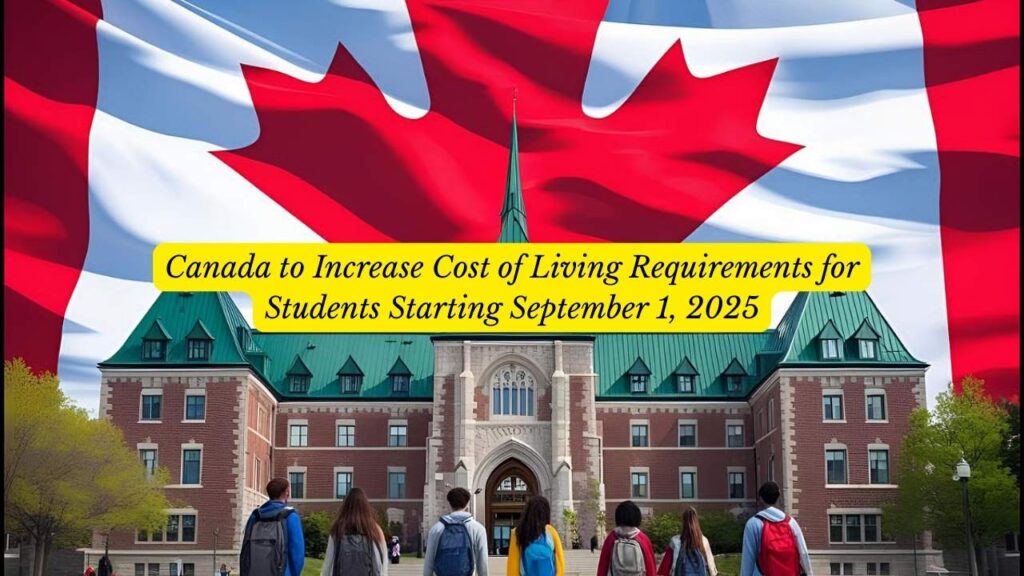Dreaming of studying in Canada? It’s a fantastic goal, and with its world-class education system, vibrant culture, and welcoming environment, Canada continues to be a top destination for international students. However, for those planning to embark on this exciting journey, there’s an important update regarding the financial requirements. Starting September 1, 2025, Canada will increase its cost of living requirements for students, a crucial update designed to ensure international students are financially prepared for life in Canada.

This adjustment, announced by Immigration, Refugees and Citizenship Canada (IRCC), reflects the rising cost of living across the country and aims to help students avoid financial hardship. In my experience advising students, understanding these financial shifts early is key to a smooth application process and a successful study experience. This article will provide comprehensive, actionable, and encouraging information to help you navigate these changes successfully.
Understanding the New Financial Landscape for Study in Canada
The Canadian government periodically updates its financial requirements for study permits to align with the Low-Income Cut-Off (LICO), a measure of the income threshold below which a family is considered to be in “low income.” This ensures that students have sufficient funds to cover their basic necessities without needing to rely on unauthorized work or public services.
For study permit applications submitted on or after September 1, 2025, the minimum funds required for living expenses for a single applicant will increase significantly. This amount is in addition to your first year’s tuition fees and travel expenses. The previous threshold, which had been in place since January 1, 2024, was CAD $20,635. The new requirement for a single applicant will be CAD $22,895. This increase of over CAD $2,000 is a direct response to the escalating costs of housing, food, and other daily essentials across Canada.
Canada to Increase Cost of Living Requirements for Students Starting September 1, 2025
| Family Size (including applicant) | New Funds Required (CAD) |
| 1 person | $22,895 |
| 2 people | $28,502 |
| 3 people | $35,040 |
| 4 people | $42,543 |
| 5 people | $48,252 |
| 6 people | $54,420 |
| 7 people | $60,589 |
| Each additional family member | $6,170 |
The increase in Canada’s cost of living requirements for students starting September 1, 2025, is a significant change, but it’s one that you can absolutely navigate with careful planning and proactive preparation. This adjustment is designed to support your success in Canada, ensuring you arrive financially stable and ready to focus on your studies. By understanding the new thresholds, preparing comprehensive proof of funds, exploring all available financial aid options, and budgeting wisely, you’ll be well on your way to achieving your dream of studying in Canada. Don’t let these updates deter you; instead, see them as an opportunity to build an even stronger foundation for your Canadian academic adventure. Start preparing now, and embark on this exciting journey with confidence!
These amounts are in addition to your tuition fees, which can range from CAD $15,000 to CAD $30,000 per year for undergraduate programs and CAD $10,000 to CAD $25,000 for postgraduate programs, depending on the institution and program. Don’t forget to factor in travel costs as well!

Why the Increase in Student Financial Requirements?
The rationale behind this increase is straightforward: the cost of living in Canada has risen significantly, particularly in major cities like Toronto and Vancouver. The previous financial threshold, which was set at CAD $10,000 for a single applicant for nearly two decades, simply did not reflect the true expenses faced by students. This led to situations where international students arrived in Canada only to find their funds inadequate, potentially leading to financial distress and exploitation.
- Ensure student well-being: By requiring a more realistic proof of funds, the government hopes to protect students from financial hardship.
- Maintain program integrity: This measure reinforces the expectation that international students can financially support themselves, reducing reliance on unauthorized employment.
- Reflect economic realities: The annual adjustment based on LICO ensures that the financial requirements keep pace with inflation and real-world costs.
Preparing for the Increased Requirements: Your Action Plan
While the new requirements may seem daunting, with proper planning, you can successfully navigate this process. Here’s how to prepare:
1. Understand Your Total Budget
Beyond the increased cost of living requirements, you need a comprehensive budget that includes:
- Tuition Fees: Research your specific program and institution for accurate figures.
- Travel Expenses: Factor in flights, visas, and initial transportation upon arrival.
- Health Insurance: This is mandatory for international students and can cost between CAD $600 to CAD $900 per year, though some provinces integrate international students into their public healthcare.
- Books and Supplies: Allocate funds for textbooks, stationery, and other academic materials.
- Personal Expenses: This includes mobile phone plans, internet, entertainment, and miscellaneous needs.
2. Gather Robust Proof of Funds
Immigration, Refugees and Citizenship Canada (IRCC) requires clear and verifiable proof that you have the necessary funds. This is a critical component of your Canada study visa application. I’ve seen many successful applicants meticulously organize their financial documents, which makes a huge difference.
- Bank Statements: Provide statements for the past four to six months showing consistent funds. Ensure there are no large, unexplained deposits that could raise red flags.
- Guaranteed Investment Certificate (GIC): This is a popular and secure option. A GIC from a participating Canadian financial institution ensures that a portion of your funds is available to you upon arrival and then disbursed periodically to cover living expenses.
- Student or Education Loan: A letter from a recognized bank confirming an approved student loan. A disbursement letter, showing the funds have been released, is even stronger evidence.
- Scholarship or Funding Letters: Official letters from your university or an organization confirming any scholarships, grants, or financial aid you’ve received.
- Proof of Prepaid Tuition or Accommodation: Receipts showing that you have already paid for your first year’s tuition or secured accommodation can significantly strengthen your application.
- Sponsorship Letters: If you have a sponsor (e.g., family member, institution), provide a detailed letter outlining their commitment to support you, along with proof of their financial capacity and your relationship to them.
3. Explore Funding Options
While you’re preparing your financial proof, consider these avenues to support your studies:
- Scholarships and Bursaries: Many Canadian universities and external organizations offer scholarships specifically for international students. Research these opportunities thoroughly.
- Part-time Work: International students with a study permit may be eligible to work up to 20 hours per week during regular academic sessions and full-time during scheduled breaks. This can help supplement your funds, but remember it shouldn’t be your primary source of financial proof for the visa application.
- Budgeting and Cost-Saving Strategies:
- Shared Accommodation: Opting for shared apartments or student dorms can significantly reduce housing costs.
- Cook at Home: Preparing your own meals is far more economical than dining out frequently.
- Public Transportation: Utilize student discounts on monthly transit passes.
- Student Discounts: Always ask about student discounts at stores, cinemas, and attractions.

4. Plan Early and Seek Expert Advice
The earlier you start planning and saving, the better equipped you’ll be. The process of gathering documents and understanding the nuances of immigration requirements can be complex. Don’t hesitate to seek guidance.
Bridging the Gap: Navigating Irrelevant Skill Distances for Working Abroad
The Complete 2025 Guide to the USA Citizenship Process for Disability Exemptions
FAQs
Q1. What is the new cost of living requirement for a single student applying for a Canadian study permit from September 1, 2025?
For a single applicant, the new minimum living expense requirement will be CAD $22,895 per year, effective for applications submitted on or after September 1, 2025. This amount is in addition to your tuition fees and travel expenses.
Q2. Does the new cost of living requirement apply to all provinces and territories in Canada?
Yes, these new requirements apply to all provinces and territories in Canada, except Quebec. Quebec maintains its own specific financial thresholds for international students.
Q3. What documents are accepted as proof of funds for a Canadian study permit application after September 2025?
Immigration, Refugees and Citizenship Canada (IRCC) accepts several types of documents as proof of funds. These include:
- Bank statements from the past four to six months.
- A Guaranteed Investment Certificate (GIC) from a participating Canadian financial institution.
- An official student or education loan approval letter from a recognized bank.
- Official letters confirming scholarships, grants, or financial aid you’ve received.
- Proof of prepaid tuition or accommodation fees.
- A bank draft that can be converted to Canadian dollars.
- A sponsorship letter from an individual or institution providing financial support, along with their financial proof.
Q4. Why is Canada increasing the cost of living requirements for international students?
The increase is a proactive measure by IRCC to ensure that international students are adequately prepared for the actual cost of living in Canada. This adjustment, aligned with the Low-Income Cut-Off (LICO), helps to protect students from financial hardship, reduce reliance on unauthorized work, and ensure they can focus on their studies without undue financial stress, reflecting the rising costs of housing, food,










